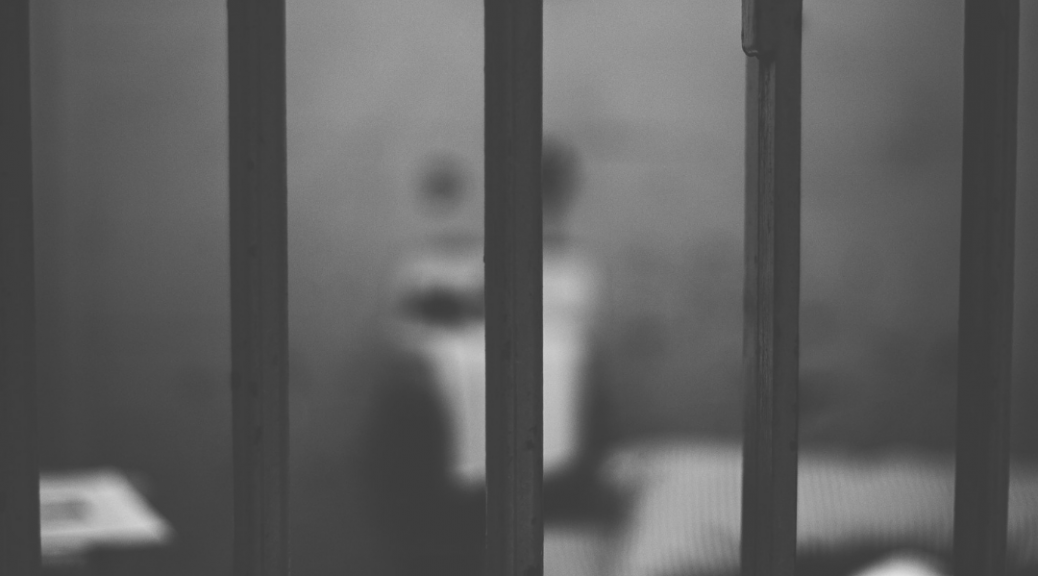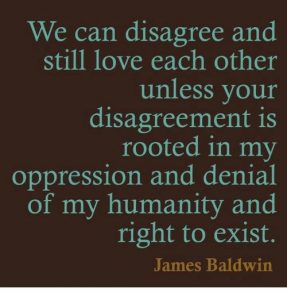
Racial Justice, MLK, and the Toxic Sides of “Christian Nice”
The whole time I’ve been developing this series on the toxic sides of “Christian (Midwest Middle Class White People) Nice,” I haven’t been able to give credit to all of my influences in looking at the topic other than a few key concepts from my area of communication studies (helpful as though those have been!). I’ve been wanting to give credit to Martin Luther King, Jr. for awhile and connect these concepts to racial justice, and I can only apologize for taking this long to get there.
But in the wake of all the ridiculous people burning their Nikes (such a disturbing connection to burning crosses!), I especially wanted to take a post to “pass the mic” to a legendary African American minister and some excerpts from Martin Luther King, Jr.’s 1963 “Letter from Birmingham Jail.”
(I also have included a related James Baldwin quote in the accompanying image.)
Perhaps you’ll find it helpful to read it back and forth with some of the other articles on “Christian Nice” (maybe especially the most recent article on “political disgusts” I was unconsciously socialized into) to see how it influenced me. I’ll provide a list of related articles at the bottom of the page in case you want to. I should note that others are better experts on racial justice than I am–but as you’ll see, I couldn’t let another week go past without letting some important prophetic words speak on this subject. (I will add some bolding for emphasis–don’t blame him for that, please!) At any rate, enjoy!
 Letter from Birmingham Jail (excerpts)
Letter from Birmingham Jail (excerpts)
By Rev. Martin Luther King, Jr., 16 April 1963
“First, I must confess that over the last few years I have been gravely disappointed with the white moderate. I have almost reached the regrettable conclusion that the Negro’s great stumbling block in the stride toward freedom is not the White Citizen’s Council-er or the Ku Klux Klanner, but the white moderate who is more devoted to “order” than to justice; who prefers a negative peace which is the absence of tension to a positive peace which is the presence of justice; who constantly says “I agree with you in the goal you seek, but I can’t agree with your methods of direct action;” who paternalistically feels he can set the timetable for another man’s freedom; who lives by the myth of time and who constantly advises the Negro to wait until a “more convenient season.”
Shallow understanding from people of goodwill is more frustrating than absolute misunderstanding from people of ill will. Lukewarm acceptance is much more bewildering than outright rejection.”
…
“In spite of my shattered dreams of the past, I came to Birmingham with the hope that the white religious leadership of this community would see the justice of our cause, and with deep moral concern, serve as the channel through which our just grievances would get to the power structure. I had hoped that each of you would understand. But again I have been disappointed. I have heard numerous religious leaders of the South call upon their worshippers to comply with a desegregation decision because it is the law, but I have longed to hear white ministers say, “follow this decree because integration is morally right and the Negro is your brother.” In the midst of blatant injustices inflicted upon the Negro, I have watched white churches stand on the sideline and merely mouth pious irrelevancies and sanctimonious trivialities. In the midst of a mighty struggle to rid our nation of racial and economic injustice, I have heard so many ministers say, “those are social issues with which the gospel has no real concern,” and I have watched so many churches commit themselves to a completely other-worldly religion which made a strange distinction between body and soul, the sacred and the secular.
So here we are moving toward the exit of the twentieth century with a religious community largely adjusted to the status quo, standing as a tail-light behind other community agencies rather than a headlight leading men to higher levels of justice.”
Martin Luther King, Jr.
“Letter From The Birmingham Jail”
April 16, 1963
I love these prophetic words so much, and have been so convicted by them, as well as by the stories of many people from marginalized and disenfranchised groups. I want to say right now that #IBelieveThem.
In saying that, I don’t pretend to be some sort of holier-than-thou “white savior.” I fully confess that it took me entirely much too long to get to this point, and I still mess up with this goal. But the truth is that I’m willing to stand up against white supremacy wherever I find it, no matter how subtly it expresses itself. (Including inside of me, because I know it’s there.)
These toxic systems (racism, sexism, xenophobia, etc.) hurt us all, and I want all of us to live in as healthy of a society as possible.
Friends who don’t have my privilege of white skin, please do be kind enough to point out if I disconfirm you, please (I know that may feel risky, so I also understand if you don’t)!
At any rate, let’s all speak up as we can to serve the common good, and seek justice for all, especially those in vulnerable groups. We can do this thing! Go team #AssertiveSpirituality.
____
The Reverend Martin Luther King’s letter talked about feeling unlistened to and uncared for by the “good Christian people.” In one week (Thursday, September 20, from 7-9 p.m. Central Time) Assertive Spirituality is hosting a free Online Listening Cafe on the topic of listening when we disagree across spiritualities, including in situations like that described above when there is deep hurt from the lack of listening. RSVP now at the Facebook event page: all you’ll need is a web browser to access the discussion section of the event page. If you absolutely can’t pop in during the scheduled time but want to participate, make sure to click “Interested”: I’ll be sending out a notification in the next few days about how to participate early (I’ll be setting up some threads for response).
Also note that THIS WEEKEND, on Sunday, September 16, the weekly email newsletter will be containing an excerpt of my review of Kathy Khang’s book Raise Your Voice: Why We Stay Silent and How to Speak Up, which gets into some of these issues related to speaking up when race, ethnicity, and gender are factors. This won’t be posted to the blog or the Twitter or the Facebook page, but only available to newsletter subscribers, so sign up in the top bar if you want to get this bonus content! The only other place it’s appearing is in the print Fall edition of the Englewood Review of Books magazine.
Related Posts:
- The Toxic Spirituality of “Christian (Midwest Middle Class White People) Nice”
- The Toxicity of “Christian Nice” Part 2: Some Tips to Counter Cordial Hypocrisy
- Swear-Policing Part 2/”Christian Nice” Part 3: The Robert DeNiro Vulgarity Case
- Christian Folk, Please Stop Enabling Human Rights Violations!
- How “Christian Nice” Literally Makes Us Sick
- Christian Folk, Let’s Stand Up Against Abuse
- In Pursuit of True Civility; Or, On Standing Up for the Common Good
- Outrage Fatigue and the Sources of Political Conflict; Or, Why We’re All So Freaking Tired
- On Finding and (Re)building Meaning in the Midst of Outrage Fatigue
- Toward Healthier Communication Climates; Or, Why We Need to Speak Up
- “Christian Nice,” Morality, and Political Disgust (Part 1)
- The Relational Consequences of Sacred Talk
- Competing (Dis)Tastes: “Christian Nice,” Moralities, and Political Disgusts (Part 2)


3 thoughts on “Racial Justice, MLK, and the Toxic Sides of “Christian Nice””
King also said (along these same lines): “In the end, we will remember not the words of our enemies, but the silence of our friends.”
Yes! Love that quote! I can’t remember if I’ve already shared that one over on our Facebook feed before (FB.me/assertivespirituality)–I post shorter quotes like that regularly over there about conflict and spirituality issues, and MLK has featured several times.
Please sign me up for weekly newsletter.
Thanks.
Gary West